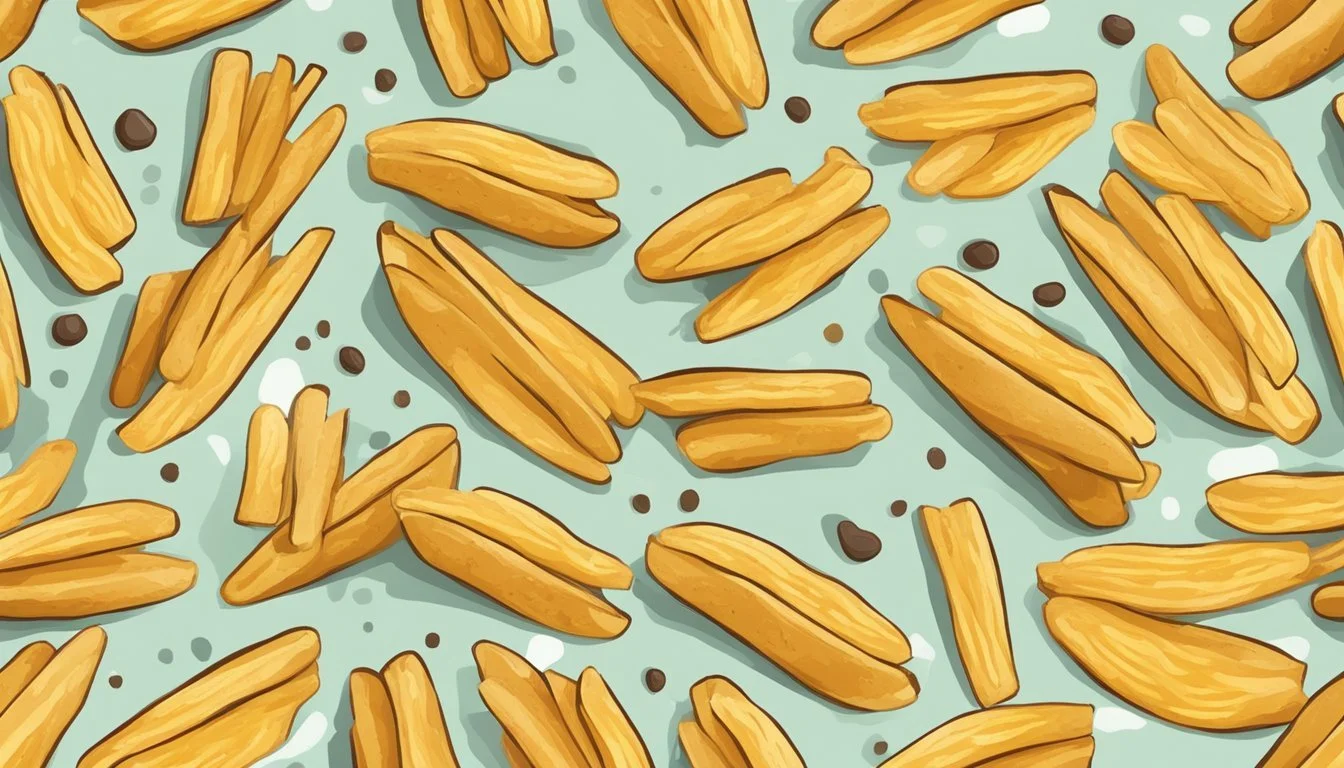How Long Do French Fries Last?
Proper Storage Guidelines
Cooked French fries can stay fresh and edible for 3 to 5 days when stored in the refrigerator. This longevity, though, depends on proper storage methods, such as using shallow airtight containers or wrapping them tightly in heavy-duty aluminum foil or plastic wrap. If these methods are followed, the fries maintain their best flavor and texture within this timeframe.
Extending the shelf life of French fries even further is possible by freezing them, where they can be kept for up to six months without significant quality loss. Reheating techniques also play a crucial role in preserving the fries' taste and texture. Using an oven or air fryer is generally the best bet for getting them back to their crispy, delicious state.
Knowing how to store and reheat French fries properly helps make the most out of leftovers, saving time and reducing food waste. By following these simple guidelines, it's easy to enjoy tasty French fries even days after they've been cooked.
Understanding French Fries
French fries, a popular food item globally, are commonly made from potatoes and cooked using various methods. They are known for their crispy texture and versatility in seasoning.
Origins and Popularity
French fries originated from Belgium where they were first cooked in the 1600s. They gained popularity in France and later spread to other parts of the world. Today, both homemade French fries and those served in restaurants are staples in many cultures.
They are often associated with fast food and are a preferred side dish due to their savory taste, complemented by salt and various seasonings. Countries like the United States have them as a crucial part of their cuisine, particularly in the form of fast-food offerings.
Composition and Cooking Methods
French fries are made primarily from potatoes, a starchy root vegetable. The key ingredients involve potatoes, oil, and salt. The cooking process typically starts with cutting the potatoes into strips. Properly cutting and blanching the fries helps achieve the desired texture.
They can be cooked in several ways, including deep-frying, baking, or air-frying. Deep-frying in oil is the most traditional method and gives fries their signature crispy outer layer. Baked or air-fried versions are considered healthier options, reducing the amount of oil used while still providing a crispy texture. Seasoning can vary widely, from simple salt to more complex spice blends.
Initial Storage and Shelf Life
Understanding how to store french fries is crucial in maintaining their quality and extending their shelf life. The main factors include proper post-cooking storage techniques and maintaining an optimal storage temperature.
Storing After Cooking
Proper storage after cooking ensures french fries remain safe to eat and retain their quality. Cooked french fries should be placed in shallow airtight containers to avoid excess moisture and maintain their texture. Wrapping them tightly with heavy-duty aluminum foil or plastic wrap can also help.
Storing them in the fridge, they generally last 3 to 5 days but check for any off odor or changes in appearance. If they emit a foul smell or appear slimy, discard them. Frozen french fries can be stored for up to 6 months if kept at a stable, cold temperature.
Optimal Temperature for Storage
Temperature plays a vital role in the shelf life of french fries. When storing in the fridge, ensure it maintains a temperature below 40°F (4°C) to slow bacterial growth. French fries left at room temperature for over 2 hours should be discarded, as bacteria multiply rapidly.
For longer preservation, freeze french fries. Your freezer should be at 0°F (-18°C) or lower. This not only extends their shelf life up to 12 months but also retains their quality when reheated. Avoid frequent opening of the freezer to maintain a consistent temperature and prevent freezer burn.
Proper storage conditions and temperature management are key to ensuring your french fries remain safe and delicious over time.
Freezing French Fries
When freezing French fries, it is important to use proper techniques to maintain their quality and ensure they stay crispy upon reheating.
Proper Freezing Techniques
To freeze French fries, start with freshly cooked or par-cooked fries. Cool the fries to room temperature before freezing to avoid moisture build-up. Spread them on a baking sheet lined with parchment paper to prevent sticking. This method of spreading also ensures they freeze individually and don’t clump together.
After the fries are frozen solid, transfer them to an airtight container or a freezer bag. Removing as much air as possible from the bag will help prevent freezer burn. Properly stored French fries can last in the freezer for 6-12 months at a constant temperature of 0°F (-18°C).
Defrosting and Reheating Tips
When ready to reheat frozen French fries, there are several methods to choose from. Oven reheating involves preheating the oven to 425°F (220°C), spreading the fries on a baking sheet, and baking for 15-20 minutes until they are heated through and crispy. For a faster option, use an air fryer by preheating to 400°F (200°C) and cooking for 10-12 minutes, shaking the basket occasionally.
Avoid microwaving as it may result in soggy fries. If you prefer using a skillet, heat a small amount of oil over medium heat and cook the fries for 5-7 minutes, turning occasionally for even crispiness.
Never refreeze previously thawed fries as this can degrade their texture and flavor.
Spotting Spoilage and Health Risks
French fries can lose their quality and potentially pose health risks when they spoil. Key signs of spoilage include changes in texture, smell, and appearance. Consuming spoiled fries can lead to various health issues, including foodborne illnesses.
Identifying Bad French Fries
One primary indicator is texture. Fresh fries should be crispy on the outside and fluffy inside. Spoiled fries often become soggy, excessively hard, or greasy. Another sign is discoloration. Fresh fries have a uniform color, while spoiled ones may have dark spots or mold growth.
Smell is also a critical factor. Good fries have a pleasant aroma, whereas spoiled fries emit a sour, rancid odor. Look for bacterial growth or mold, which make fries unappetizing.
Temperature influences spoilage. Fries left at room temperature for more than two hours can rapidly develop bacterial contamination. Fries stored improperly, without airtight containers or proper wrapping, tend to spoil faster due to exposure to humidity.
Risks Associated with Spoiled Fries
Eating spoiled fries can cause adverse health effects. Bacterial contamination from organisms like E. coli or Salmonella is a common risk, potentially leading to food poisoning. Symptoms include nausea, vomiting, and diarrhea.
Foodborne illnesses can also result from consuming fries affected by mold. Mold growth on fries can produce mycotoxins, harmful substances that complicate health issues.
Improper storage increases risks. Fries that are thawed and reheated repeatedly or left in non-sealed containers in humid conditions are more prone to spoilage. Consuming these can lead to indigestion or more severe health problems.
Properly stored and maintained fries, kept in a sealed environment and reheated correctly, minimize health risks and ensure safety. Avoiding consumption of fries with suspicious signs ensures one's well-being.
Frequently Asked Questions
French fries can last varying lengths of time depending on how they are stored. Proper storage significantly impacts their quality and usability.
Best Practices for Longevity
To preserve the quality of frozen uncooked french fries, keep them at a consistent temperature of 0°F. Ideally, use them within 3 months, although they can last up to 12 months. Minimize opening the freezer door and the bag to prevent freezer burn and quality degradation.
For cooked french fries, store them in an airtight container or wrap them tightly in aluminum foil or plastic wrap. They will last about 3 to 5 days in the fridge. Freezing cooked fries can extend their life up to 6 months but may affect texture.
Dealing with Common Concerns
French fries become soggy when left out too long due to air exposure, causing the exterior to dry out and the interior to steam. Refrigeration can prevent this sogginess by retaining moisture.
When asked about calories, it is crucial to confirm with the specific brand or method of preparation as this can vary greatly. French fries left unrefrigerated for more than a couple of hours should go in the trash to avoid foodborne illnesses.
For reheating fries that have been stored, preheat an oven to 400°F. Place fries evenly on a baking sheet and bake for 5 to 10 minutes until heated through. This method restores some of the original texture and is preferable to microwaving, which can leave them limp.






